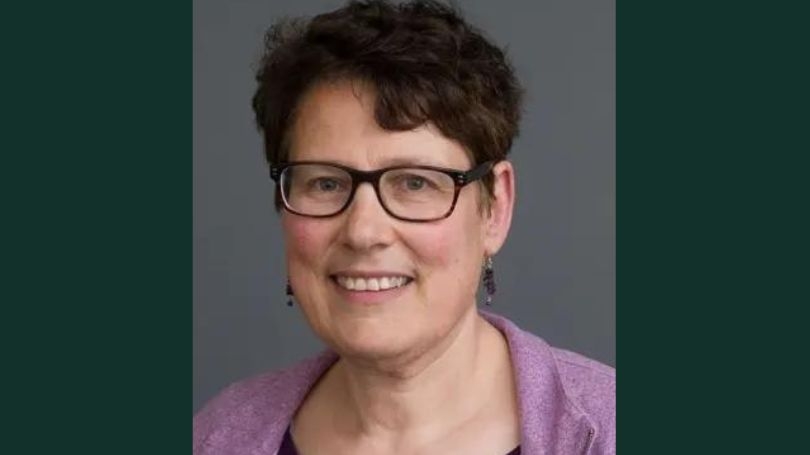
- About
- Departments & Programs
- Faculty Resources
- Governance
- Diversity
- News
Back to Top Nav
Back to Top Nav
Back to Top Nav
Back to Top Nav
The far-ranging work of the late associate professor influenced fields including comparative literature, English and French literature, and medieval and renaissance studies.
Monika Otter, an associate professor of English and creative writing, died on May 5 following an illness. A faculty member at Dartmouth since 1991, Otter was a scholar of Latin, French, and English literature from the 11-13th centuries.
"Monika was a gifted and generous scholar whose far-ranging work influenced fields including comparative literature, English and French literature, and medieval and renaissance studies," Dean Elizabeth F. Smith said in a message to the Dartmouth community. "She was treasured in our community for her compassion, supportive nature, and brilliance with languages, and will be deeply missed."
Otter was born on Dec. 15, 1959 in Ailingen, Germany. She attended the University of Freiburg, where she completed a Staatsexamen, with a concentration in English and German studies. She also attended the University of Massachusetts, Amherst, where she earned an MA in English in 1983; the University of Toronto, where she completed work in medieval studies; and Columbia University, where she received her MPhil and PhD in English and comparative literature.
Otter came to Dartmouth in 1991 as an assistant professor and was promoted to associate professor in 1997. Her scholarly work focused on how we understand the use of language, particularly in relation to medieval texts, and on translation theory. Working in German, Latin, French, Italian, and English, and with reading knowledge of Dutch, Spanish, and Provençal, plus a smattering of medieval Welsh and ancient Greek, Monika's command of languages was wide-ranging and impressive.
Otter authored two books, Inventiones: Fiction and Referentiality in Twelfth-Century English Historical Writing (1996) and The Book of Encouragement and Comfort: Goscelin's Letter to the Recluse Eva (2004). She also wrote over 30 articles, several of which she presented at the long-established Medieval Seminar at Dartmouth.
Over the course of her tenure at Dartmouth, Otter was a cherished and enthusiastic member of the medieval studies community on campus and throughout the northeast. She co-convened the biennial Medieval Colloquium in 2005, 2007, 2009, 2013, and 2015.
A talented singer, Otter traveled regularly to Boston to sing in choirs. Her musicianship (she also played viola da gamba) influenced her scholarship, and her keen ear illuminated her thinking and writing. Despite her illness, Otter continued an active program of scholarship, with her chapter "Literary Soundscapes: Music, Literature and Aural Experience" forthcoming in Oxford Twenty-First Century Approaches Series: High Medieval: Literary Cultures in England. Other recent work includes a book project, with the working title First Persons: Voices and Masks in Medieval Latin Literature.
Otter also routinely engaged in service to the Dartmouth community. She served on the Committee of Graduate Fellowships, the Committee on the Faculty, the Steering Committee for the Writing Program, and the Committee on Policy, among several others. Additionally, she served as vice chair of English, director of graduate studies in comparative literature, as a member of the Medieval and Renaissance Studies Steering Committee, and as co-director of Humanities 1&2.
Otter taught courses in a variety of departments and programs on campus, including English and creative writing, comparative literature, classics, and women's, gender, and sexuality studies. Until she became too ill to teach this term, she taught "Chaucer and the Canterbury Tales" and the graduate studies course "Workshop in Critical Writing."
Many students praised Otter's understanding, fairness, and well-considered feedback that improved their abilities to think and write critically. One of her students from the fall term's "Old English and Scandinavian Epic and Saga" wrote: "Hours were spent burning the midnight oil in pursuit of understanding the Old English I was reading. I'm a better person and academic because of it." Another noted, "Prof. Otter engages with her students, even the shy ones. She creates a very welcoming environment."
Otter was cherished by many in the Arts and Sciences community as a dedicated mentor to junior scholars and as an exceptional friend and colleague. She had a particular talent for welcoming scholars into the Dartmouth community and offering well-considered advice. Her unflagging interest in whatever intellectual question arose in her colleagues' work and the sheer joy she would take in conversations about various academic pursuits are memories held dear by many on this campus.